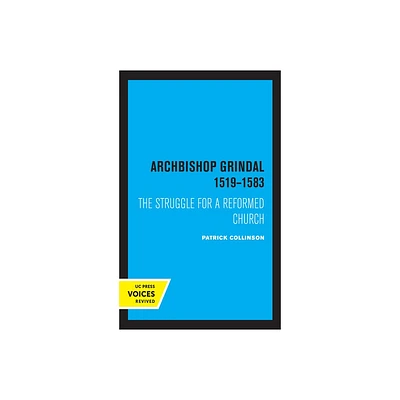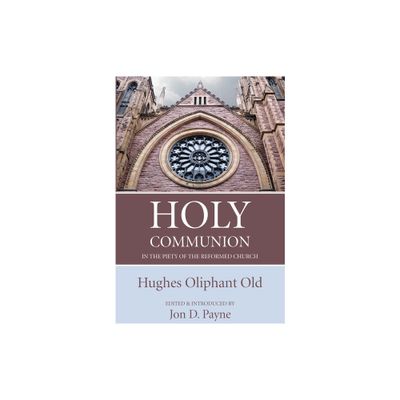Home
Archbishop Grindal, 1519-1583: The Struggle for a Reformed Church
Loading Inventory...
Barnes and Noble
Archbishop Grindal, 1519-1583: The Struggle for a Reformed Church
Current price: $95.00


Barnes and Noble
Archbishop Grindal, 1519-1583: The Struggle for a Reformed Church
Current price: $95.00
Loading Inventory...
Size: Hardcover
*Product Information may vary - to confirm product availability, pricing, and additional information please contact Barnes and Noble
This biography of Edmund Grindal, Archbishop of Canterbury during the Elizabethan era, reveals the complexities and challenges he faced in his attempts to reform the English Church. Historically, Grindal’s primacy has often been viewed skeptically, with some historians and contemporaries labeling him ineffective or overly sympathetic to Puritanism, which conflicted with Elizabeth I's religious policies. Despite being criticized for his administrative abilities and branded as too lenient, Grindal held steadfast to his beliefs. His refusal to suppress the "prophesyings" — public Bible expositions popular among Puritans — led to a serious conflict with Queen Elizabeth, who placed him under suspension. Grindal’s resistance to what he saw as autocratic demands reflected his commitment to a more reformed, less politically compromised church, an ideal he upheld even when it led to his personal and professional downfall.
In his lifetime and beyond, Grindal’s reputation became a battleground for opposing views within the English Church, from those who admired his Protestant integrity to those who saw him as overly accommodating to Puritan influences. As the political climate shifted, Grindal was alternately praised by Puritans as a standard-bearer for reform and criticized by later figures for his perceived leniency toward dissenters. In post-revolutionary England, his image further polarized, with high church advocates viewing him as a weak link in Elizabeth's ecclesiastical hierarchy, while others praised his resistance to authoritarian control. Grindal's legacy was contested, caught between different visions of Anglican identity and church governance.
This biography seeks to re-evaluate Grindal, considering the unique context of the early English Reformation. Rather than depicting him simply as either a weak administrator or a proto-Puritan, it presents him as a representative of an early Elizabethan Protestantism shaped by experiences under Edward VI and exile during Mary I’s reign. Grindal’s vision for the Church aligned with the ideals of continental reformers like Bucer and Calvin, which often clashed with the monarch’s more conservative approach. His efforts highlight a pivotal moment in the history of the English Church, one that points to the potential for a more integrated Protestant reform that ultimately, due to political pressures and institutional resistance, remained unrealized.
This title is part of UC Press's Voices Revived program, which commemorates University of California Press’s mission to seek out and cultivate the brightest minds and give them voice, reach, and impact. Drawing on a backlist dating to 1893, Voices Revived makes high-quality, peer-reviewed scholarship accessible once again using print-on-demand technology. This title was originally published in 1979.
In his lifetime and beyond, Grindal’s reputation became a battleground for opposing views within the English Church, from those who admired his Protestant integrity to those who saw him as overly accommodating to Puritan influences. As the political climate shifted, Grindal was alternately praised by Puritans as a standard-bearer for reform and criticized by later figures for his perceived leniency toward dissenters. In post-revolutionary England, his image further polarized, with high church advocates viewing him as a weak link in Elizabeth's ecclesiastical hierarchy, while others praised his resistance to authoritarian control. Grindal's legacy was contested, caught between different visions of Anglican identity and church governance.
This biography seeks to re-evaluate Grindal, considering the unique context of the early English Reformation. Rather than depicting him simply as either a weak administrator or a proto-Puritan, it presents him as a representative of an early Elizabethan Protestantism shaped by experiences under Edward VI and exile during Mary I’s reign. Grindal’s vision for the Church aligned with the ideals of continental reformers like Bucer and Calvin, which often clashed with the monarch’s more conservative approach. His efforts highlight a pivotal moment in the history of the English Church, one that points to the potential for a more integrated Protestant reform that ultimately, due to political pressures and institutional resistance, remained unrealized.
This title is part of UC Press's Voices Revived program, which commemorates University of California Press’s mission to seek out and cultivate the brightest minds and give them voice, reach, and impact. Drawing on a backlist dating to 1893, Voices Revived makes high-quality, peer-reviewed scholarship accessible once again using print-on-demand technology. This title was originally published in 1979.


















